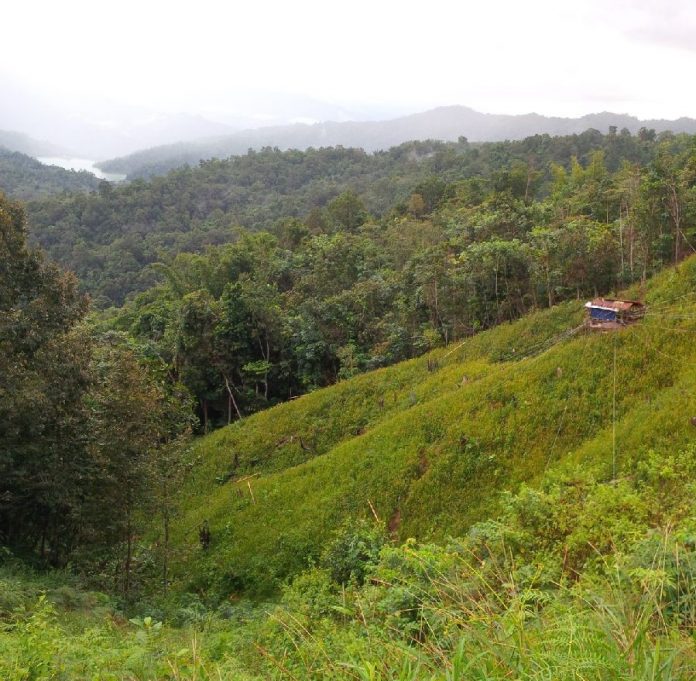
A view of Babagon Catchment. Forever Sabah was tasked with the challenge of facilitating the various government agencies, water supply managers and three resident communities in a collaborative process to work out how to pay for better management of this crucial water catchment.-Photo by Forever Sabah
KOTA KINABALU: The world is waking up to the financial practicalities of how we humans rely on “mother nature”, or what scientists call “ecosystem services”.
Even if we don’t care about biodiversity, environmental breakdown is costing people lots of money.
It turns out it is often cheaper to spend a little money looking after nature than to suffer the consequences of losing what it gifts us for free.
Economists call that “Payment for Ecosystem Services” or PES.
A good example is water. When we damage our forests, the dams, canals and pipes become filled with mud as soon as heavy rains cause floods, and when there is drought the flow reduces to a trickle.
Once water is muddy and full of agricultural or other chemicals the costs of water purification increase greatly.
When these things go wrong the first instinct is to spend more money on dams, pipes and treatment plants, or what is known as “grey infrastructure”.
But governments around the world are getting smarter – it is often a lot cheaper to look after a forest than to fix the consequences with heavy engineering.
Therefore, they are now thinking about “green infrastructure” that integrates nature into infrastructure planning in line with nature-based solution approaches.
Sabah is waking up to this too, and has been working on developing PES laws, policies and capacities for the last five years.
About 57% of Kota Kinabalu’s water comes from the steep forests above the Babagon Dam. With the support of Yayasan Hasanah, the state government decided to pilot Payment for Ecosystem Services (PES) here in 2016.
Forever Sabah was tasked with the challenge of facilitating the various government agencies, the water supply managers and the three resident communities (Kg Tampasak, Kg Babagon Toki and Kg Kolosunan) in a collaborative process to work out how to pay for better management of this crucial water catchment.
The work has been exciting as well as hard.
The process has been led by a committee of government agencies and community representatives organized by the Natural Resource Office.
Gerald Jetony, the Secretary of the Sabah Biodiversity Centre, describes how collaboration led to a “pathway forward to sustainability” based upon “enhancing the livelihoods of the local community through empowering them in management of the resource”.
Over the last few years, the communities have become River Rangers and developed Village Development and Water Catchment Management Plans.
They have celebrated Memorandums of Understanding with the Fisheries Department, Department of Irrigation and Drainage and Sabah Forestry Department, and begun new livelihoods aligned with maintaining water quality such as organic farming, ecotourism and mushroom production. They have also started to reforest riparian zones.
The Nature Conservancy has worked with thirteen countries on four continents to create 43 Water Funds, with 35 more in development, and loaned Sabah one of their senior attorneys, Froylan Hernandez-Ruiz, to assist Sabah’s design process alongside local experts brought in by Forever Sabah, lawyer Chen Kok-On and economist Yeo Bee Hong.
Years of practical effort yielded an exciting conclusion in September when the NRO-led committee gave consensual endorsement to technical recommendations around establishing an independent multi-stakeholder Water Fund.
Under this recommendation, the Babagon Catchment Water Fund (reporting to the Sabah Water Resources Council) would gather PES payments from a wide range of sources ranging from government green infrastructural investments and water utility company savings to a levy on the bill of Kota Kinabalu water uses.
Then it would direct that money into contracts with catchment residents for stewardship of the watershed that can guarantee reliable and lower cost water supplies to the city far into the future.
The implementation of these recommendations awaits cabinet consideration by the State Government.
One of the Project Field Coordinators, Jeffrey Abun from Kg Kolosunan spoke of his: “appreciation to Yayasan Hasanah and Forever Sabah for their guidance throughout the project to achieve our objectives in Babagon Dam Water Catchment Conservation Area.
Now we feel ready to go to the next stage. Let’s try to implement in Babagon Catchment and pioneer PES for Sabah and Malaysia”.
The post Advancing PES solution to securing KK water appeared first on Borneo Post Online.


